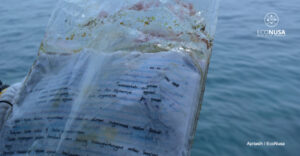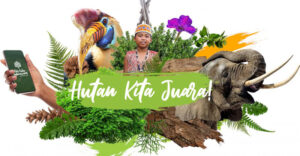
In the Land of Papua, people do not consider universe anthropocentrically which is concerned about mankind as the central of the universe. If applied, environment is merely part of one of tools to support the existence of mankind to achieve prosperity. As to the people in the Land of Papua, nature is one of the universe elements which correlates to transcendental life.
Esteeming the ancestors while conserving the surrounding nature was showed by local people of Kambala Village, Kaimana Regency in West Papua Province, to the 2019 EcoNusa Mangrove Expedition Team through Sinara traditional ceremony. It is deemed an offering rite to tete-nene (local attributes to ancestors) as thanksgiving prayer. Sinara symbolizes an asking for permission from the local community to the ancestors prior to doing something. For Kambala Village people, nature and natural resources are not the absolute rights of mankind on the planet.
Sinara rite is held by offering betel, betel nut, rice, cigarette and coin. These materials are parts of the community daily lives. Those offerings are wrapped in white fabric on the white plate. To ask permission to the EcoNusa Mangrove Expedition Team, the set of offerings were floated on the water with prayers performed by one of the religious leaders.
The 2019 EcoNusa Mangrove Expedition aimed to create map of mangrove in West Papua while identifying possibility of new species. The Expedition Team also recorded the potential benefit of sustainable use of mangrove that could help boost up peoples’ livelihood. The Mangrove Expedition was done thanks to the collaboration of EcoNusa Foundation, Papua University and West Papua Province’s Research and Development Agency.
“Ari and I should go to Kaimana town in search of white fabric and plate. We went there on the night before the Sinara ceremony on the next morning. When drifting the Sinara, other chief of clan also took part in it,” said Wiro Wirandi, the Ocean Program Manager of EcoNusa Foundation.
Ratna Patriana in her thesis entitling Sasi Dynamics in Kaimana: Change of Institution in Traditional Management of Sea Resources (IPB, 2017) said that Sinara tradition is often performed for various kinds of activities, such as cutting trees, building a house, manufacturing boat, clearing land for plantation. As to Ratna, Sinara is done as the compensation of the lost live due to human activity such as boat manufacturing.
Ratna said that Sinara is one of the local wisdoms of Papuan peoples in natural resources management. It implies that each change, even the least, of natural landscape could hardly be overlooked.
Ratna also noted that Sinara ceremony is also carried out for opening and closing sasi. To perform Sasi, people provide the other crops such as chicken and eggs as offerings in addition to the aforementioned materials.
On the other cases, eight Kaimana indigenous tribes performed Sinara ceremony when they hand in the sea management to the government of Kaimana Regency. They are annoyed by the presence of boats from outside Kaimana that exploit sea resources. Those boats breach the Sasi as traditionally agreed by the local people.
“From the ancestors, we understand conservation through a traditionally-called sasi. However, many boats coming from outside violate the rules and we could do nothing due to the absence of technology. Now we hand in all sea territories of the local people to the Regency Government so as to create a Local Sea Conservation Region (KKLD) or in our language we call it big sasi,” said Marthen Feneteruma, the Chief of Papuan Customary Council as quoted by Kompas.com.
Editor: Leo Wahyudi







